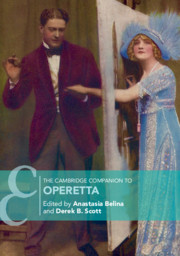68 results
Contents
-
- Book:
- The Cambridge Companion to Operetta
- Published online:
- 14 November 2019
- Print publication:
- 05 December 2019, pp ix-x
-
- Chapter
- Export citation
16 - British Operetta after Gilbert and Sullivan
- from Part III - Operetta since 1900
-
-
- Book:
- The Cambridge Companion to Operetta
- Published online:
- 14 November 2019
- Print publication:
- 05 December 2019, pp 246-260
-
- Chapter
- Export citation
Copyright page
-
- Book:
- The Cambridge Companion to Operetta
- Published online:
- 14 November 2019
- Print publication:
- 05 December 2019, pp viii-viii
-
- Chapter
- Export citation
Chronology, 1855–1950
-
- Book:
- The Cambridge Companion to Operetta
- Published online:
- 14 November 2019
- Print publication:
- 05 December 2019, pp xix-xxvi
-
- Chapter
- Export citation
Select Bibliography
-
- Book:
- The Cambridge Companion to Operetta
- Published online:
- 14 November 2019
- Print publication:
- 05 December 2019, pp 295-304
-
- Chapter
- Export citation
Notes on Contributors
-
- Book:
- The Cambridge Companion to Operetta
- Published online:
- 14 November 2019
- Print publication:
- 05 December 2019, pp xiv-xviii
-
- Chapter
- Export citation
Part III - Operetta since 1900
-
- Book:
- The Cambridge Companion to Operetta
- Published online:
- 14 November 2019
- Print publication:
- 05 December 2019, pp 187-294
-
- Chapter
- Export citation
Part I - Early Centres of Operetta
-
- Book:
- The Cambridge Companion to Operetta
- Published online:
- 14 November 2019
- Print publication:
- 05 December 2019, pp 15-86
-
- Chapter
- Export citation
Part II - The Global Expansion of Operetta
-
- Book:
- The Cambridge Companion to Operetta
- Published online:
- 14 November 2019
- Print publication:
- 05 December 2019, pp 87-186
-
- Chapter
- Export citation
Music Examples
-
- Book:
- The Cambridge Companion to Operetta
- Published online:
- 14 November 2019
- Print publication:
- 05 December 2019, pp xiii-xiii
-
- Chapter
- Export citation
Tables
-
- Book:
- The Cambridge Companion to Operetta
- Published online:
- 14 November 2019
- Print publication:
- 05 December 2019, pp xii-xii
-
- Chapter
- Export citation
Index
-
- Book:
- The Cambridge Companion to Operetta
- Published online:
- 14 November 2019
- Print publication:
- 05 December 2019, pp 305-320
-
- Chapter
- Export citation
18 - Operetta Films
- from Part III - Operetta since 1900
-
-
- Book:
- The Cambridge Companion to Operetta
- Published online:
- 14 November 2019
- Print publication:
- 05 December 2019, pp 272-285
-
- Chapter
- Export citation
Illustrations
-
- Book:
- The Cambridge Companion to Operetta
- Published online:
- 14 November 2019
- Print publication:
- 05 December 2019, pp xi-xi
-
- Chapter
- Export citation
Introduction
-
-
- Book:
- The Cambridge Companion to Operetta
- Published online:
- 14 November 2019
- Print publication:
- 05 December 2019, pp 1-14
-
- Chapter
- Export citation

The Cambridge Companion to Operetta
-
- Published online:
- 14 November 2019
- Print publication:
- 05 December 2019
Appendix 3 - Operettas with English Librettos by Composers for the German Stage
-
- Book:
- German Operetta on Broadway and in the West End, 1900–1940
- Published online:
- 27 June 2019
- Print publication:
- 11 July 2019, pp 319-323
-
- Chapter
-
- You have access
- Open access
- HTML
- Export citation
6 - Operetta and Intermediality
- from Part II - The Reception of Operetta
-
- Book:
- German Operetta on Broadway and in the West End, 1900–1940
- Published online:
- 27 June 2019
- Print publication:
- 11 July 2019, pp 191-220
-
- Chapter
-
- You have access
- Open access
- HTML
- Export citation
3 - The Business of Operetta
- from Part I - The Production of Operetta
-
- Book:
- German Operetta on Broadway and in the West End, 1900–1940
- Published online:
- 27 June 2019
- Print publication:
- 11 July 2019, pp 89-124
-
- Chapter
-
- You have access
- Open access
- HTML
- Export citation
Appendix 6 - Research Resources
-
- Book:
- German Operetta on Broadway and in the West End, 1900–1940
- Published online:
- 27 June 2019
- Print publication:
- 11 July 2019, pp 345-350
-
- Chapter
-
- You have access
- Open access
- HTML
- Export citation



